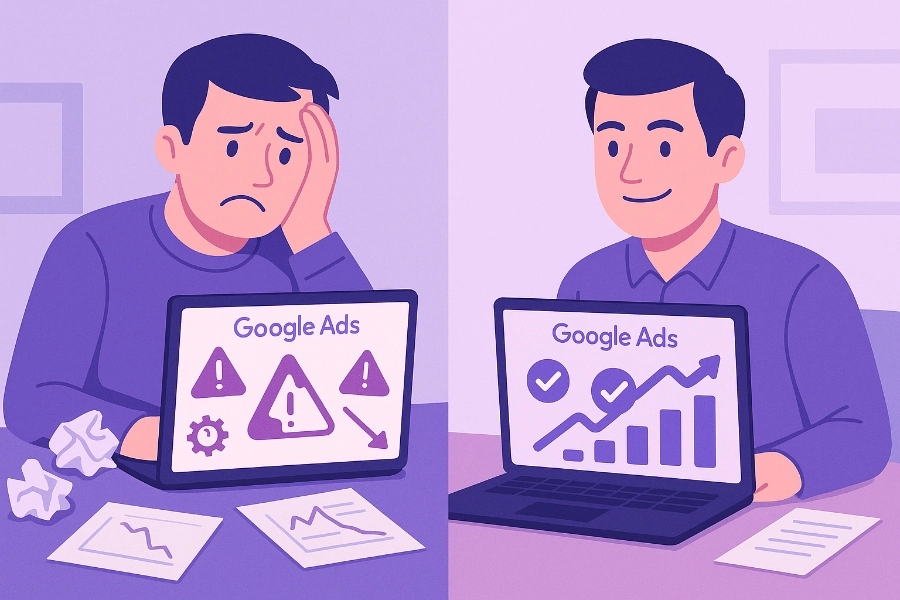Google Ads is one of the most effective platforms for capturing potential customers and increasing a company’s visibility in search engines. Its ad system allows it to reach users with high purchasing intent at the right time, making it an ideal tool for generating conversions. However, this same potential can work against it if not configured properly. A poorly structured campaign not only wastes budget but can also present an unprofessional image of the business, affect the conversion rate, and frustrate marketers. Therefore, understanding and avoiding the most common mistakes is essential to make the most of this tool.
The Importance of Avoiding Common Mistakes in Google Ads
Often, the campaigns of Google Ads that fail to deliver results are not a result of the platform itself, but rather of its misuse. Many small and medium-sized businesses make the mistake of launching campaigns quickly, without prior strategy or analysis. This not only reduces the return on investment but can lead to erroneous conclusions such as “Google Ads doesn’t work,” when in fact the problem lies in the configuration or a lack of optimization. Preventing errors and understanding their impact can make the difference between a profitable campaign and one that simply wastes resources.
How Errors Affect Performance and Budget
Every click your ad receives represents a direct investment of your budget. Therefore, it’s vital that those clicks come from users with a genuine interest in your products or services. For example, if you don’t exclude irrelevant keywords, you could appear for searches like “free website templates” when what you offer is professional custom design services. This type of traffic not only doesn’t convert, but it also alienates you from your target audience. Furthermore, a low CTR (click-through rate) can negatively impact your ad’s Quality Score, increasing your cost-per-click (CPC) and reducing your ad’s position in search results. In short, errors not only impact your budget immediately, but also affect the long-term efficiency of your campaigns.
Impact of Poor Campaign Configuration
Setting up a campaign without clear objectives, correctly defining ad groups, or analyzing target audience behavior can lead to disappointing results. A common mistake is using the “clicks” objective instead of “conversions” when the real goal is to generate sales or form completions. Furthermore, many companies set up a single, generic campaign without segmenting by product, location, or customer type, which prevents them from personalizing messages and leveraging the platform’s full potential. This lack of strategy can result in campaigns that appear active but don’t generate real value for the business.
Common Mistakes in Google Ads
Avoiding basic errors will allow you to make the most of your invested budget and achieve sustainable results over time. Let’s look at the most common mistakes and how to solve them effectively.
Not using negative keywords
Negative keywords allow you to filter out search terms that are not aligned with your offer. By adding them, you prevent your ads from being shown to people who aren’t interested in your products or are looking for something completely different. For example, if you offer advanced digital marketing training, you should exclude searches like “free digital marketing course” or “digital marketing PDF,” which are likely to attract users who don’t want to pay for a professional service. Creating a list of negative terms from the start, and expanding it with your campaign’s search reports, can help you reduce unqualified clicks by up to 30-40%, resulting in direct budget savings and increased performance.
Poor Audience Targeting
An effective campaign depends not only on good keywords but also on showing ads to the right audience. Google Ads allows you to target by geographic location, language, device, demographics, interests, and purchasing behaviors. Ignoring these options or leaving default settings enabled can result in your ads reaching people who will never become customers. For example, if you sell plumbing services in Valencia and don’t limit your location, you could be paying for clicks from users in other cities or countries. Similarly, if your product is targeted to a specific age range, not targeting it correctly could mean wasting impressions and clicks on users outside your ideal customer profile.
Poorly tailored offers
The Google Ads bidding system determines how much visibility you’ll get relative to your competitors. If you set bids too high, you could burn through your budget in just a few hours without any conversions. On the other hand, if your bids are too low, your ads will barely show and you won’t generate enough traffic. It’s recommended to use automated bidding strategies such as Target CPA or Target ROAS only when you have enough past conversions for the algorithm to work optimally. For new or untested campaigns, a manual strategy with control over device, location, or audience settings may yield better initial results.
Ignoring Ad Extensions
Extensions not only increase ad size but also allow you to highlight key information that can convince the user to click. Some useful extensions include links to specific sections of your site, a phone number for direct calls, business location, customer reviews, and promotional offers. For example, a call extension can increase the number of direct contacts from mobile devices, while a location extension can attract nearby users. Implementing at least three types of extensions improves click-through rates and gives your ads greater relevance.
Campaign Structure Mistakes
A well-designed structure is one of the fundamental pillars of a successful Google Ads campaign. It’s not just about how you organize your ads, but how that organization affects the relevance, targeting, and efficiency of your campaigns. A poor structure can cause you to lose control over which message each type of user sees, hinder data analysis, and limit the ability to optimize properly. On the other hand, a clear structure allows you to create more scalable campaigns, easily understand which elements are working, and make quick adjustments without negatively impacting the rest. This is especially important when you manage multiple products, services, or customer segments, as inadequate segmentation can dilute the message and reduce the impact of your advertising.
In this context, one of the most common mistakes is inefficient ad group organization.
Poor Ad Group Organization
Grouping many different keywords into a single ad group makes it difficult to create relevant copy. Ideally, each group should have closely related keywords and a specific ad that reflects them. This improves Google’s Quality Score, reduces CPC, and increases CTR. For example, if you sell different types of footwear, create separate groups for “women’s sneakers,” “men’s dress shoes,” and “children’s boots,” each with corresponding ads and extensions. This segmentation allows for greater control, better measurement, and a better user experience.
Incorrect use of budget
Many advertisers distribute their budget equally among campaigns without analyzing which one generates the most conversions or revenue. This approach can lead to underfunding profitable campaigns and maintaining campaigns that don’t generate returns. The most efficient approach is to use performance data to periodically reallocate resources. For example, if a remarketing campaign generates 80% of conversions at a lower cost, it’s worth increasing its budget and reducing the budget for ineffective campaigns.

Lack of clear campaign objectives
Each campaign should have a specific goal: generating leads, sales, calls, form completions, etc. Setting up campaigns without a clear purpose makes it difficult to evaluate results and optimize them. Furthermore, without defined objectives, conversion events cannot be properly configured, which prevents you from leveraging automated bidding strategies. Establishing clear KPIs from the outset facilitates decision-making and the comparison of results between campaigns or periods.
Ad Optimization
Launching a campaign is just the starting point. From that point on, the most important phase begins: ongoing optimization. This stage involves regularly reviewing performance, identifying opportunities for improvement, and implementing strategic changes to increase ad effectiveness. Even well-designed campaigns can stagnate if they aren’t adjusted as market trends, user behavior, or competition change. The key is not to settle for acceptable results, but to always seek continuous improvement to maximize ROI.
Not Performing A/B Testing on Ads
A/B testing is essential to identify which type of message best connects with your audience. You can test different headlines, descriptions, calls to action, or ad formats. For example, you could compare “Request your quote today” vs. “Free, no-obligation consultation” and see which generates more clicks or conversions. Documenting these results allows you to develop a library of effective messages for future campaigns, improve lead quality, and increase your conversion rate.
Ineffective Copy
Ad copy should be direct, persuasive, and focused on the user’s benefit. Generic messages like “we’re the best” don’t communicate value. In contrast, copy like “Free 24-hour shipping + money-back guarantee” offers tangible benefits. Additionally, incorporating terms like “today,” “now,” or “limited” can drive action through a sense of urgency. Copy should focus on the problem your product solves and highlight what differentiates you from the competition.
Not Optimizing Ads for Mobile
Currently, more than 60% of Google searches are conducted on mobile devices. This means your ads should be designed to provide a seamless experience on small screens. Make sure landing pages load quickly, ad copy is short and clear, and action buttons are visible and accessible. If your site isn’t optimized for mobile, your bounce rate will increase, reducing your Quality Score and negatively impacting your campaign.
Lack of Conversion Tracking
Measuring what really matters is essential to turning an advertising campaign into a profitable investment. It’s not enough to see how many clicks or impressions you generate; it’s crucial to understand whether those results translate into valuable actions for your business, such as sales, form completions, or direct contacts. Without accurate measurement, it’s impossible to know which strategies are working and which aren’t, which prevents you from making decisions based on real data. Implementing a proper tracking system is the first step to optimizing, scaling, and justifying your investment in Google Ads with complete clarity.
Not Setting Up Conversion Tracking
Without tracking, you’re flying blind. You can’t know which ads, keywords, or devices are generating sales or leads. Google offers several ways to track: codes on thank-you pages, events in Google Tag Manager, or imports from Google Analytics. Implementing this system not only allows you to measure but also optimize based on real data, applying smart bidding strategies and discarding elements that don’t generate results.
Incorrect Metrics
Focusing solely on impressions or clicks can be misleading. A campaign can have thousands of clicks and zero conversions. Ideally, you should analyze metrics such as CPA (cost per acquisition), conversion rate, conversion value, and ROAS (return on ad spend). These metrics tell you whether you’re actually making money with your campaigns or just generating traffic with no economic impact.
ROI Monitoring
ROI analysis should be performed periodically, ideally weekly or monthly. This allows you to identify optimization opportunities, pause ineffective campaigns, scale profitable ones, and adjust messages or segmentations. It’s also useful for justifying the investment to partners or superiors and demonstrating the real profitability of advertising efforts.
How to Fix Common Google Ads Mistakes
Fortunately, most of the mistakes that affect the performance of a Google Ads campaign aren’t irreversible. With rigorous analysis, a strategic approach, and a constant focus on improvement, it’s possible to identify what’s going wrong, implement the necessary adjustments, and begin to see tangible results. Correcting these errors not only optimizes your budget but also improves lead quality, user experience, and overall ROI. The secret is to approach every aspect of the campaign with data in hand and a mindset of continuous optimization.
Continuous Campaign Optimization
Optimization is an iterative process: analyze, adjust, and measure. It’s not about making impulsive changes, but rather implementing gradual, data-driven improvements. Start by reviewing your search term report, adjusting bids based on performance by device or audience, and testing new ad creatives. Even small changes like changing a keyword from broad match to phrase match can significantly increase conversions.
Tools to Improve Performance
In addition to Google Analytics and Keyword Planner, tools like Looker Studio (formerly Data Studio), SEMrush, Ahrefs, and even CRM integrations offer valuable insights to improve decision-making. You can view the entire funnel from impression to conversion and identify bottlenecks or leak points.
Campaign Audit
A monthly or quarterly audit should be part of your routine. This review includes analyzing location settings, devices, ad scheduling, negative keyword lists, CTRs by ad group, and landing page behavior. A well-conducted audit can reveal inefficiencies that, once corrected, double or triple the results achieved.
Improve Campaign Performance with a Professional Strategy
Having professional help not only saves you time in the daily management of your campaigns, but it can also make a big difference in the results you achieve. A Google Ads expert knows the best practices, has a thorough understanding of the platform, and knows how to apply advanced strategies that often go unnoticed by those who don’t dedicate themselves to it full-time. Delegating this task to a professional means avoiding costly mistakes, making the most of every euro invested, and focusing your efforts on what really matters: growing your business.
How an Expert Can Improve Ad Performance
A specialized consultant or agency has the technical knowledge and experience to quickly detect errors, implement best practices, take advantage of new platform features, and design strategies tailored to your business. This translates into greater efficiency, cost savings, and better results with less effort on your part.
Experience and strategy in Google Ads campaigns
An experienced professional can help you implement advanced techniques such as dynamic remarketing, similar audiences, bidding on customer lists, or integration with external platforms. They can also help you build a complete conversion funnel, from traffic acquisition to automated lead tracking, which increases the likelihood of closing sales.
__________________________
Are your Google Ads campaigns not delivering results?
Request a free audit with us and discover how to optimize your campaigns with customized strategies. We help you get the most out of your Google Ads investment, correcting errors and enhancing what works.



0 Comments